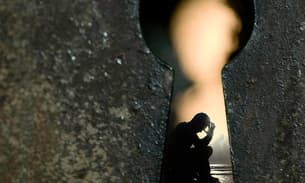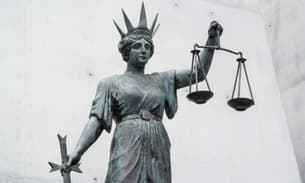
Justice in a cold climate
Chilly Sweden has a tradition of open justice nearly 300 years old (Image: Shutterstock)
The title of this paper is a play on the title of an article written by the eminent jurist H. L. A. Hart, ‘Law in a Cold Climate’. Hart’s article was about the school of jurisprudence known as Scandinavian Legal Realism. This paper has no pretensions to jurisprudential import. Its ambition is limited to offering a couple of illustrations concerning ‘open justice’ from a comparative, historical perspective. The ‘cold climate’ is a reference to the fact that one example is drawn from Scotland and the other from Sweden.
Scotland
The principle of open justice in that country is not a recent development. Two statutes of the (pre-1707) Scottish Parliament are illustrative. The second is still considered as being in force.
a. Evidence Act appointing publication of the testimonies of witnesses
Our sovereign lord, considering how much it does import and concern the good and interest of his majesty’s lieges, and the due administration of justice, that witnesses be distinctly and fully examined, and their depositions written in plain and clear words as they are given; therefore his majesty, with advice and consent of the estates of parliament, statutes and ordains that, in all processes presently depending or to be intended before the lords of privy council, lords of session and all other judges within this kingdom, the witnesses who are made use of and adduced therein shall be examined in the presence of the parties or their advocates, they being present at the diets of examination, and that there be publication of the testimonies of the witnesses in the clerks’ hands allowed to the parties gratis before advising, to the effect parties may have copies thereof if they think fit, any law or act of parliament, custom or usage to the contrary notwithstanding.
b. Court of Session Act anent advising with open doors before the session

Our sovereign lord and lady the king and queen’s majesties, considering that the advising of causes with open doors is usual in the sovereign judicatories of other nations, and that the like practice here will be of advantage to the lieges, do, with advice and consent of the estates of parliament, statute and ordain that in all time coming, all bills, reports, debates, probations and others relating to processes shall be considered, reasoned, advised and voted by the lords of session with open doors, where parties, procurators and all others are hereby allowed to be present, as they used to be formerly in time of debates, but with this restriction, that in some special cases the said lords shall be allowed to cause remove all persons, except the parties and their procurators, and that no person presume to speak after the lords begin to advise under the pain of imprisonment, unless he be desired by the lords. And hereby cass and annul all former laws and acts of parliament appointing or allowing the lords to advise with closed doors.
Also worthy of note is the dictum of Lord President Inglis in Richardson v Wilson (1879), regarding the right of newspapers to be in court to report proceedings. He stated that:
The publication by newspapers of what takes place in court at the hearing of any cause is undoubtedly lawful: and if it be reported in a fair and faithful manner the publisher is not responsible though the report contain statements or details of evidence affecting the character of either of the parties or of other persons; and whatever takes place in open court falls under the same rule, though it may be either before or after the proper hearing of the cause. The principle on which this rule is founded seems to be that, as courts of Justice are open to the public, anything that takes place before a judge or judges is thereby necessarily and legitimately made public, and, being once made legitimately public property, may be republished without inferring any responsibility.
It must be possible for society’s state of affairs to become known to everyone, and it must be possible for everyone to speak his mind freely about it. Where this is lacking, liberty is not worth its name. Peter Forsskal, 1759
Sweden
Probably, most would not be surprised to learn that Sweden has a tradition of ‘open justice’. However, historically, the main tack adopted with respect to ‘open justice’ in that jurisdiction has been rather distinctive. The key development took place during the so-called Age of Liberty, 1720 – 1772.
Whilst largely connected with political liberty – principally the rise of the four Estates (jointly, the Parliament/Riksdag) vis-à-vis the Monarchy – the period did also see increasing demands for civil liberty.
A representative sentiment from a little-known source is that expressed by the world-renowned botanist and apostle of von Linne, Peter Forsskal. Almost unknown is the fact that he also authored a controversial pamphlet, Thoughts on Civil Liberty (1759). Committed to openness in the broader context of social and scientific progress, Forsskal wrote:
So, the life and strength of civil liberty consist in limited Government and unlimited freedom of the written word… ….it is also an important right in a free society to be freely allowed to contribute to society’s well-being. However, if that is to occur, it must be possible for society’s state of affairs to become known to everyone, and it must be possible for everyone to speak his mind freely about it. Where this is lacking, liberty is not worth its name.
The pamphlet was banned on the day it was published. This helped fuel the gathering firestorm that led, ultimately, to the passage of the ‘world’s first freedom of information act’ in December 1766. In that sense, Forsskal’s work was an important intellectual catalyst for the measure. Forsskal himself was dead (aged 32) by the time of its adoption, having contracted a fatal illness in Jerim, Yemen, whilst part of an expedition to ‘Felix Arabia’ commissioned by the King of Denmark.
Conventionally understood, freedom of information laws are means of legally compelling public authorities (e.g., central and local government) to disclose information they hold. Significantly though, the 1766 law contains several sections pertinent to the issue of making the administration of justice more transparent and giving the right to publish legal and judicial information.
On a point of nomenclature, the Swedish law is usually referred to as the ‘Freedom of the Press Act’ (1766). This is somewhat misleading. The full title of the measure is ‘His Majesty’s Gracious Ordinance Relating to Freedom of Writing and of the Press’. But, there was no developed ‘press’ in the sense of a media industry in mid-eighteenth century Sweden. The connotation of ‘press’ (from the Swedish ‘tryckfrihetsförordningenin’ in the law’s title) is a reference to the printing press. ‘Tryck’ means something that is printed.
The 1766 Ordinance addresses two main topics. First, it deals with the abolition of prior censorship and the freedom to publish. The latter is far from absolute, a number of matters being made legally immune from criticism or questioning. Second, there is the appearance of the legally revolutionary principle of public access to official information. This is described by the Swedish term ‘offentlighetsprincipen’, which has an even broader connotation.
There are several sections which specifically mention court and legal information in addition to what would be included more conventionally as official documents.
Article 6 states:
This freedom of the press will further include all exchanges of correspondence, species facti, documents, protocols, judgments and awards, whether they were produced in the past or will be initiated, maintained, presented, conducted and issued hereafter, before, during and after proceedings before lower courts, appeal and superior courts and government departments, our senior administrators and consistories or other public bodies, and without distinction between the nature of the cases, whether these are civil, criminal or ecclesiastical or otherwise in some degree concern religious controversies; as well as older and more recent appeals and expositions, declarations and counter-declarations that have been or will be submitted to the Chambers of Our Supreme Court as well as the official correspondence and memorials that have already been or may in future be issued from the Office of the Chancellor of Justice; although no one may be obliged to obtain and print more of all this, either in extensor or abridged as a species facti, than he himself requests and regards as adequate and which, when requested, shall immediately be issued to anyone who applies for them, on penalty of the provisions in the following paragraph but in criminal cases that have been settled by an amicable reconciliation between private individuals no one may, without the agreement of the parties, make use of this freedom as long as they remain alive; while also, if anything concerning grave and unfamiliar misdeeds and abominations, blasphemies against God and the Head of State, evil and cunning schemes in these and other serious criminal cases, superstitions and other such matters should appear in court proceedings or judgments, they shall be completely excluded.
Article 7 continues:
Whereas a legally correct votum does not have to be concealed in cases where a decision is arrived at only by the vote of the judge; and as an impartial judge has no need to fear people when he has a clear conscience, while he will, on the contrary, be pleased if his impartiality becomes apparent and his honour is thereby simultaneously protected from both suspicions and pejorative opinions; We have therefore, in order to prevent the several kinds of hazardous consequences that may follow from imprudent votes, likewise graciously decided that they shall no longer be protected behind an anonymity that is no less injurious than unnecessary; for which reason when anyone, whether he is a party to the case or not, announces his wish to print older or more recent voting records in cases where votes have occurred, they shall, as soon as a judgment or verdict has been given in the matter, immediately be released for a fee, when for each votum the full name of each voting member should also be clearly set out, whether it be in the lower courts or the appeal and superior courts, government departments, executory authorities, consistories or other public bodies, and that on pain of the loss of office for whosoever refuses to do so or to any degree obstructs it; in consequence of which the oath of secrecy will in future be amended and corrected in this regard.
Finally, Article 9 prescribes:
In addition to the records of trials and other matters referred to above, everyone who has a case or other proceedings touching his rights before any court or public body whatsoever, as also before Ourselves, the Estates of the Realm, their select committees and standing committees, shall be free to print an account of it or a so- called species facti, together with those documents relating to it that he regards as necessary to him; although he should in this matter keep to the truth, should he be concerned to avoid the liabilities prescribed in law.
This short tour of two jurisdictions north and northwest of England highlights the point that the legal roots for the concept of ‘open justice’ are rather varied. The Scottish items are sourced in pre-Union Scottish Parliamentary Acts. The Swedish contribution emerges from a less likely basis: its famous 1766 Ordinance.
Citing historical sources, however, is no guide to the current vitality of the notion in either jurisdiction – or the ways in which it can be expanded and improved upon.
(c) Dr David Goldberg. This is an extract from Justice Wide Open, a collection of working papers published in June 2012 as part of the ‘Open Justice in the Digital Era’ project at the Centre for Law, Justice and Journalism, City University London, http://bit.ly/openjustice.




